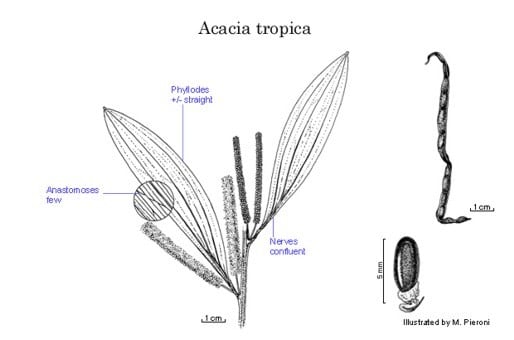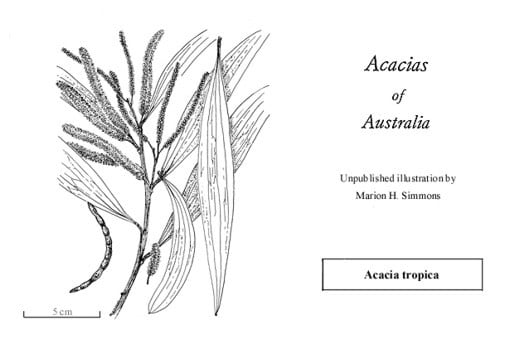Acacia tropica (Maiden & Blakely) Tindale
WATTLE
Acacias of Australia
Family
Fabaceae
Distribution
Occurs in the Gulf country of N.T. between Roper Hwy and the McArthur R. and on Groote Is., and in parts of northern Qld.
Description
Tall shrub or tree 3–8 m high, with sparse whippy branches. Bark smooth, later fibrous, grey-brown or red-brown. Branchlets acutely angular, finely striate, glabrous. Phyllodes very narrowly elliptic or sometimes elliptic, straight but sometimes shallowly recurved at apex, base normally oblique, mostly erect, 9–16 cm long, 10–40 mm wide, coriaceous, glabrous, multistriate with 3 nerves more prominent than the rest (the lowermost two ±running together near phyllode base); minor nerves widely spaced, 2 or 3 per mm and moderately anastomosing; mucro knob-like; pulvinus mostly 4–5 mm long. Spikes mostly paired in axils, 3–5.5 cm long, bright yellow; peduncles 7–15 mm long. Flowers 5-merous; calyx 0.4–0.5 mm long, dissected by c. ½, almost glabrous except for marginal cilia and scattered hyaline hairs sometimes along keels and near base; corolla 1.5–2 mm long; ovary densely hairy. Pods linear, straight to variously curved, openly coiled or undulate, 2–6 cm long, 3–3.5 mm wide, thinly crustaceous, glabrous, dark brown, prominently convex over seeds; margins pale coloured. Seeds longitudinal, oblong, 3–4 mm long, 1.8–2.5 mm wide, brown, shiny; aril terminal, cupular.
Phenology
Flowers June–Aug.
Habitat
Grows in deep sandy soil with Melaleuca viridiflora along watercourses at base of sandstone hills.
Specimens
N.T.: 30 miles [48 km] E of O.T. Stn, R.A.Perry 1872 (CANB, NSW). Qld: Westmoreland Stn, C.H.Gittins 845 (NSW); ‘Westmoreland’, L.Pedley 2092 (BRI, NSW); 17 miles [27.4 km] SW of Claraville Stn, M.Lazarides 3932 (BRI, CANB, NSW).
Notes
Acacia tropica,which is sometimes placed in the ‘A. cunninghamii group’, is characterised by glabrous branchlets, glabrous peduncles 5–15 mm long, and corollas and calyces persisting on the spikes after the stamens have fallen. According to L.Pedley, Austrobaileya 1: 174 (1978), the widely spaced secondary nerves in the phyllodes of A. tropica indicate that this species may be more closely allied to A. cowleana and A. leptocarpa than to A. concurrens and its relatives. It is closely related to A. lacertensis.
FOA Reference
Data derived from Flora of Australia Volumes 11A (2001), 11B (2001) and 12 (1998), products of ABRS, ©Commonwealth of Australia
Author
Dr M.D.Tindale and Dr P.G.Kodela with the assistance of M.Bedward, S.J.Davies, C.Herscovitch, D.A.Keith and/or D.A.Morrison
This identification key and fact sheets are available as a mobile application:
URL: https://apps.lucidcentral.org/wattle/
© Copyright 2018. All rights reserved.









